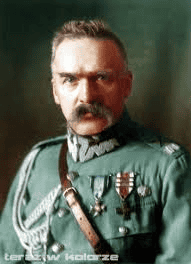
JOZEF KLEMENS PILSUDSKI
In 1914, Jóseph Piłsudski declared: “Only the sword now carries any weight in the balance for the destiny of a nation.” As I was growing up, my father loved to tell stories about his heroes. This is what he told me when I was at the university in France: “After Tadeusz Kościuszko raised a Polish army and tried but failed to give Poland its sovereignty, it took another 123 years before Piłsudski, inspired by his courage, grabbed Kościuszko’s sword and gave Poland her Freedom and Independence once more.”
Józef Piłsudski was born in Zalavas, Lithuania on December 5, 1867, but his family always considered themselves Polish. In 1910, Piłsudski was already very involved in rebuilding the Polish military with his associates, including Wladislaw Sikorski, future commander of the Polish army in exile during World War II. They set up two legal paramilitary organizations in the Austrian zone of Poland, one in Lwow (now Lviv, Ukraine), and one in Krakow, to conduct training in military science. He was a close friend of Marian Wielezynski who asked him to be the godfather of his two younger sons, Leszek and Zbyszek. Their friendship lasted until Piłsudski’s death on May 12, 1935.
In March 1920, after his heroic role during the Battle of Warsawin the fight for the second independence of Poland, Piłsudski was made First Marshal of Poland. He transformed the Polish government from a parliamentary system to a presidential system, with stronger power in the hands of the President. However, he opposed totalitarianism. In April 1935, after he helped Poland adopt a new constitution with strong powers reserved to the Executive branch, he refused to become President.
THE BATTLE OF WARSAW: From 1795 until 1918, Poland was divided among Austria, Prussia, and Russia. Upon its reemergence as an independent nation, an outcome of World War I, a reconstituted Poland immediately faced an existential threat from Moscow. The Bolsheviks under Lenin’s leadership were still consolidating power at home. However, their territorial appetites were well-known to Poles and to their new Chief of State, Józef Piłsudski. The fateful Polish-Soviet War broke out in February 1919. The Soviets made it clear that the Poles were in the way of of Russian’s larger goal which was to export communism to the rest of Western Europe. Germany, gripped by post-war economic and political chaos, seemed ripe for a Marxist revolution if only Soviet troops could move in and assist, but Poland would have to be disposed of first. Nicknamed “the Red Napoleon,” Soviet commander Mikhaïl Tukhatchevsky ordered: “To the West! Over the corpse of Poland lies the road to worldwide conflagration. March upon Vilnus, Minsk, Warsaw and onward to Berlin!” Nikolaï Bukharin, Bolshevik theoretician and Lenin’s confidant, declared publicly that the campaign would take communist forces “straight to London and Paris.” In the summer of 1920, Soviet victories seemed unstoppable as Moscow’s Red Army pushed to within striking distance of Warsaw, the Polish capital. From August 12 to 25, the battle raged. Foreign observers, including de Gaulle, expected the imminent collapse of Poland. Then, the tactical brilliance of Piłsudski and his staff, together with the legendary courage of Polish fighters, coalesced to produce what Poles call “the Miracle on the Vistula.” Lenin lamented the enormous defeat of his forces. A peace treaty with Poland was signed in mid-October. Against all odds, Poland had stopped Russia’s revolutionary expansionism dead in its tracks. There would not be a Bolshevik Western Europe. Sixty years later the Solidarity Movement in Poland would play a pivotal role in bringing the Soviet Empire to a well-deserved end.
Here is the rest of our father’s story about Thadeusz Kosciuszko.
Kościuszko was adventurous and courageous, and he had a big heart. In 1776, he emigrated to America and fought as a colonel in the Continental Army alongside George Washington. He carried within him the ideals of the Declaration of Independence: All men are created equal. When he came back to Europe, he played a role in the French revolution and became a hero in France. However, he was Polish to the core and loved Poland more than any other country. In the spring of 1794, he raised an army of mostly peasants to fight for a unified Poland free of foreign rule and of the greed of wealthy magnates. Unfortunately, Kościusko’s army was defeated, and in 1795, Poland was divided once more between Austria, Russia and Prussia. Its name was erased from some maps in Europe. Courageous Poles tried to free Poland several times throughout the 19th century, but the odds against them were insurmountable. Then, on July 28, 1914, Austria invaded Serbia. All seemed possible once more.
